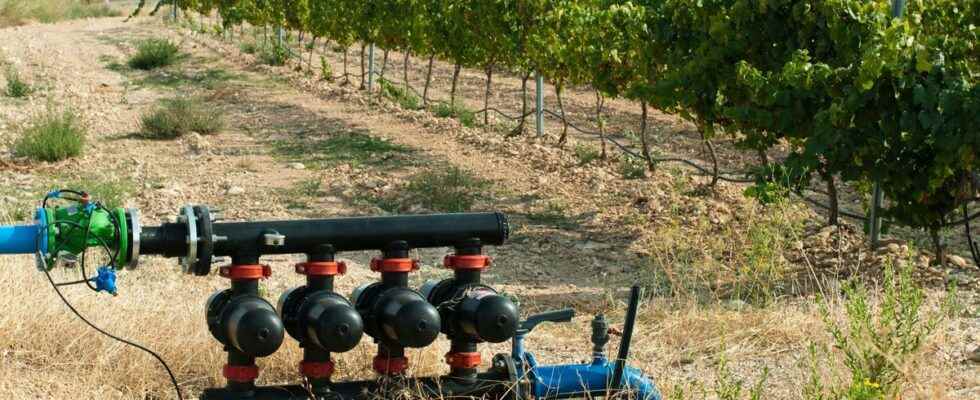FIGARO DEMAIN – France wants to catch up in this area, especially for irrigation.
Throw clean water into the sea that is lacking on land? The agglomeration of Grand Narbonne has had enough. For the past few months, 20% of the water treated by the Narbonne-Plage wastewater treatment plant has not, once it has been cleaned up, been discharged indiscriminately into the marine environment via an outfall pipe. They now irrigate, drop by drop, 80 hectares of vines that are thirsty by the drought.
Purified, then treated by UV to make it even cleaner, the water is routed to the crops via 8 km of pipes, which the winegrowers have financed, in particular, with the assistance of the water agency and the Occitania region. The seaside resort’s wastewater treatment plant is particularly busy during the summer, when the vine needs water to allow its grapes to grow, the supply corresponds to the need for the right season.
Psychological barrier
Still too rare, the deployment of reusable solutions will, we promise at Veolia Water, spread to a hundred other municipalities. In Lunel (Hérault), the device will in particular make it possible to supply water to the toilets of a future public facility but also to water municipal green spaces and stadiums, whereas today it is drinking water that is used for these purposes…
Read alsoIn France, the reuse of wastewater is still in its infancy
“We reuse in France a little less 1% of wastewater after treatment. It is 6 to 8% in Italy; 12% in Spain; and more than 60% in Israel”, says Jean-François Blanchet, Managing Director of BRL, an engineering company specializing in the design and construction of major hydraulic structures. “The paradox is that we have been developing solutions for a long time in France. However, they are exported but not used here. Despite everything, the lines are moving, in particular thanks to a new European regulation adopted in 2020.he analyzes.
Thus, French initiatives are still rare while the potential is immense. The summer of 2022, marked by an unprecedented drought, will have acted on many minds like an electric shock. The general public has become aware that the northern departments can also lack water. Moreover, great achievements have no geography. To the north of Clermont-Ferrand, a pioneering initiative involving the city, the sugar producer Cristal Union and the farmers of Limagne Noire has made it possible, since 1996, to irrigate 1,500 hectares of crops in rotation thanks to the combination of effluents from the washing plant beets and purified water coming out of a treatment plant. A solution which thus poses as an alternative to the construction of dams or retention ponds advocated by certain agricultural lobbies and contested.
Read alsoDrinking water from wastewater, a unique challenge in Europe taken up in Vendée
Still nascent in France, reuse initiatives know how to develop on a small scale. “The additional investment cost for a wastewater treatment plant like ours is under control. We are talking about 400,000 euros out of an overall envelope of more than 12 million euros for a new wastewater treatment plant», Details Pierre Soujol, the president of the community of communes of the Pays de Lunel.
In Narbonne, the agglomeration is already thinking about reusing water in other municipalities. While a new green hydrogen production activity is going to develop – which needs water for its production – on the industrial port of Port-la-Nouvelle, the community is studying the connection of the treatment plant to the factory. In this perspective, more than a third of treated water could be reused.
While the use of wastewater for irrigation or industrial purposes is gaining ground, there remains a psychological barrier – at least in Europe – to the potabilization of wastewater for consumption. Is it because necessity makes law? This technology has been in use for more than fifty years in Windhoek, the capital of Namibia… but also in the International Space Station.
Society, health, environment, education, energy
» Discover the actors and initiatives of change
